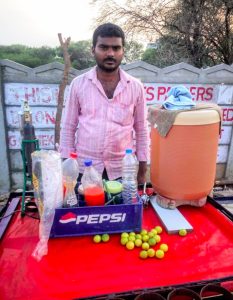People of Bharat: Murli, Hyderabad

As I walk along the road in Annaram, Telangana on a hot, blistering afternoon, I almost stumble upon a stone. “Madam sambhalke…” I hear a low voice murmuring close by. I take a moment to notice what was blocking my path; there are three sets of paving bricks stacked together. On one of them there is a man seated; this low stool is created with the raw material from a nearby construction site. Opposite to him on the road, stands a lemon-soda cart. This is how I met Murli — a medium set, dark-skinned man in his early thirties. I ask him for a lemon soda and an interview. He obliges me with both on the condition that he can continue making his daily sales.
I observe him making the lemon-soda — a popular, refreshing drink available on the roadside stalls in summer. His cart is lined with soda bottles along the front and the sides of it. There is a low table on the cart with a few lemons on it and a knife. There are a few plastic containers that hold orange colored syrup, sugar and seasoning. Murli sells two flavors; orange and masala (spices). I notice how compared to other soda hand-carts, his is without a canopy or sun-shade. As we begin talking, Murli speaks haltingly in Hindi; his sentences interspersed with English words. He tells me he has studied till the tenth standard.
Murli hails from a Machlipatnam town in Andhra Pradesh; he lives in Annaram village in a single room with kitchen, concrete dwelling with his parents, his wife and their two children aged 8 and 4. Murli tells me he had been working for 17 years — his last job was that of a private driver. A couple of years back, diagnosed with a slip-disc. Forced to quit his regular-paying job, he took up selling lemon-soda. It is only now into the conversation that I really notice the slight limp as he comes back with my lemon-soda drink. Murli’s parents were farm laborers and his father still works as one on a farm nearby. They both pool in their earnings to support the family.
Murli mans the cart from 9 in the morning till 8 at night. He goes home for lunch while his father takes over. Murli churns a drink of his customer’s choice by adding lemon juice, salt, and soda water in a plastic glass. He adds seasoning for the extra punch. For an orange-flavored drink, he add sugandham (orange flavor) and sugar. Murli sells one glass of lemon-soda for Rs. 10 and makes a profit of about Rs. 4 per glass. His daily profit is variable and ranges from Rs. 350 to Rs. 700. He tells me he sells more during peak summer hours than he would on a relatively windy day. His soda maker machine came with two gas cylinders which costed him Rs. 24,600. Each cylinder is refilled after a week or two at Rs. 350. Murli purchases 100 lemons every four days and four packets of salt every month. He roughly uses 21 kilograms of sugar for 7–10 days which he purchases at the market rate for that day. He tells me his work is of seasonal nature; he sells lemon-soda from February to June. The rest of the year he sells at a nearby vegetable market. He cuts fresh vegetables, packs them and sells these to customers.
Murli shares that most of his earnings are spent on health issues; he spends almost weekly on medicines. ‘Mereku disc problem; bachhe ko brain problem. Do brain hota na? Chota aur bada? Toh chota brain slow hai usko.’ (I have a disc problem, my son has a brain ailment. We have two brains, don’t we? A small and a large one? His smaller brain is slow). I learn that Murli’s youngest child; a boy, was born with a brain damage. ‘The doctor had told us that he would never walk or speak’ he says. Murli tells me he takes his son to the hospital every eight months for a check-up and refresh on the medication. He tells me he has spent close to Rs. 3 lakhs on his son’s treatment. ‘Usko ye nai hai’ (he cannot speak),pointing towards his mouth; ‘par abhi chalne laga hai’ (he has started walking) he smiles. I perceive in him the pride and protective biological instinct common to every father.
Murli pays a rent of Rs. 3500 each month ‘Cooler hai par chalta nahi. Bachhe ka cycle bhi’ (my child has a bicycle too), he says. Murli has a bank account but he shares he can’t save anything much. ‘Bachho ko medicines lete, fruits lete. Ghar ke pas chale jate to 200–300 kharch hojata’ (On the way home from work, I buy medicines and fruits for my children. By the time I reach home, I have already spent Rs. 200–300). ‘Bank account mai 180 hai, madam’ (I have Rs. 180 in my bank account). I point to a torn poster of Google Pay on the front side of his stall. ‘Kuch log paisa pay kia bolke paisa ni pay kiye aur mere father ko ye nahi pata, account check kia to pata chala.’ (Some of the customers didn’t pay for the soda drink and showed their phone to my father as proof; he doesn’t understand this {pointing to the phone}. When I checked my account I realised {they hadn’t paid}).
Murli admits making a living and providing for his son’s treatment while selling lemon-soda is difficult. He tells me he earned Rs. 20,000 as a driver; those were definitely better times. In the last 20 days itself, he has spent Rs. 24,000 for his son’s treatment and Rs. 5000 extra as both he and his wife fell ill with typhoid. He has borrowed Rs. 2 lakhs from relatives at 2% interest and Rs. 50,000 from the local money-lender at 3% interest; the interest is charged on the principal amount. He tells me that he has not paid the rent for two months and his life insurance premium is due as well. A few days ago he pawned about 10 grams of his wife’s gold at the local pawn shop. I sense his helplessness with a life whirling out of his control as his voice wavers with emotion.
I ask Murli about his elder child. I have a tough time figuring out the gender of the child as he calls both his kids ‘baccha’. Murli’s eight-year-old daughter is studying in third standard in Kendriya Vidyalaya — a school run by the Central Government. She got admission in a lucky draw competition held by the school to include children of financially weak families by giving them the opportunity for better education facilities. ‘Woh thoda dull hai, usko nursery, UKG nahi karaya aur seedha first class mai daal dia’ (She is dull {in studies} as we skipped her kindergarten studies and directly enrolled her to the first standard), explained Murli. His daughter will continue to study in the same school only if she manages to pass her final exams this year. Murli pays a school fee of Rs. 1800 for three months and Rs. 800 monthly for a two-way rickshaw transport as the school is not at a walkable distance.
Murli owns a smartphone and had started using Google Pay. Then he stopped as he could not afford getting cheated of even a few payments. He tells me how difficult it is to find work with his back ailments. He can’t stand for long hours and has a recurrent pain. Later this year, he plans to continue selling vegetables in the village nearby. Other than managing health expenses, he has no financial aspirations. As we draw close to our conversation, he is more optimistic. Despite his challenges, he feels things are beginning to stabilize for him. Funds were low when he had quit work; life is better now.
I ask Murli about his financial anxieties. ‘Standard nahi hai kuch bhi’ (There is no standard) he says. I misunderstand his statement — I think it’s about his social standing. He clarifies ‘business ka standard nahi hai’. I don’t press him to explain. I can understand — maybe a little.
This research was developed as part of the Bharat Inclusion Initiative.
